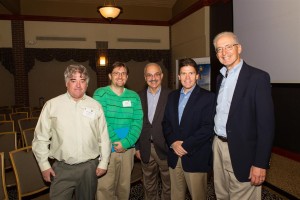Robotic Crop Health (RCH)
A team of researchers led by Dr. Daniel Barber from the UCF Institute for Simulation and Training has developed an autonomous vehicle equipped with sensors, optical camera systems, laser range finders and radar that can be fully controled through a computer and used for precision agriculture remote sensing applications. This autonomous vehicle will potentially help to reduce costs and increase the yields of agricultural products.
I-Corps helps Robotic Crop Health (RCH) team make the pivot to a data-centric strategy
“We started out thinking that we would develop a sensor-equipped autonomous ground vehicle to provide crop health monitoring for the agriculture market,” said John Lambert, Entrepreneurial Lead for the autonomous vehicle team currently participating in the UCF I-Corps program. “Thanks to I-Corps, we gained valuable market insight and now have pivoted our strategy.”
Lambert explained that the team’s primary focus now is on delivering a data collection, integration and analysis capability for monitoring crop health and other agricultural applications. The vehicle and form factor in which the system resides is secondary.
“We’ve learned that the most important thing to potential customers is the data and information analytics—not the vehicle hardware,” said Lambert. “That’s crucial insight that has allowed us to refocus without expending significant resources down a wrong path.”
The team—which also includes UCF Institute for Simulation and Training and Robotics Club faculty advisor Daniel Barber, Ph.D., Principal Investigator, industry Mentor David Spitzer, and additional team members Don Harper and John Robbins, Ph.D.—is currently conducting a field demonstration to collect crop canopy thermal data. A variety of other data collection field demonstrations are planned.
The team’s data collection platform currently is engineered to monitor crop stress and health using sensors mounted on static locations, such as on top of a barn or tree. In later phases of the development, the data collection platform will be engineered for mobile applications, such as human-operated and autonomous vehicles and will employ added sensors and data collection capabilities.
“We’re excited about the market opportunity because the traditional approach to crop monitoring is labor intensive based on a farmer’s previous experience, augmented with costly satellite and aircraft data which often arrives too late,” said Lambert. “We’re focused on providing crop health information, at a price the customer can afford, that can be collected day and night and reported promptly to enable the farmer to make better decisions.”






